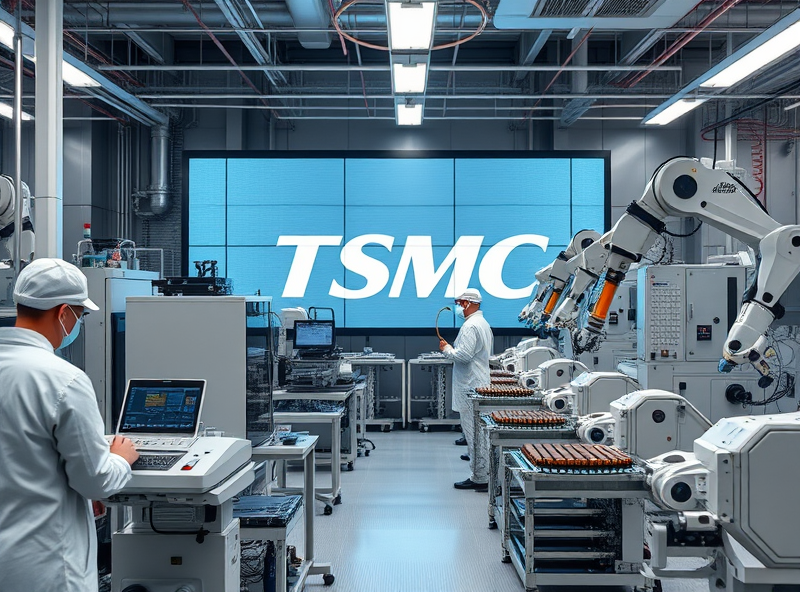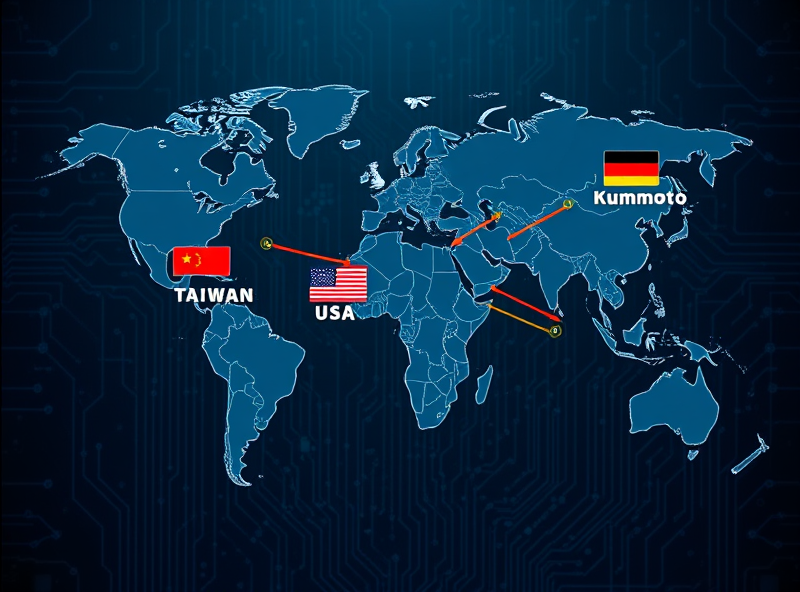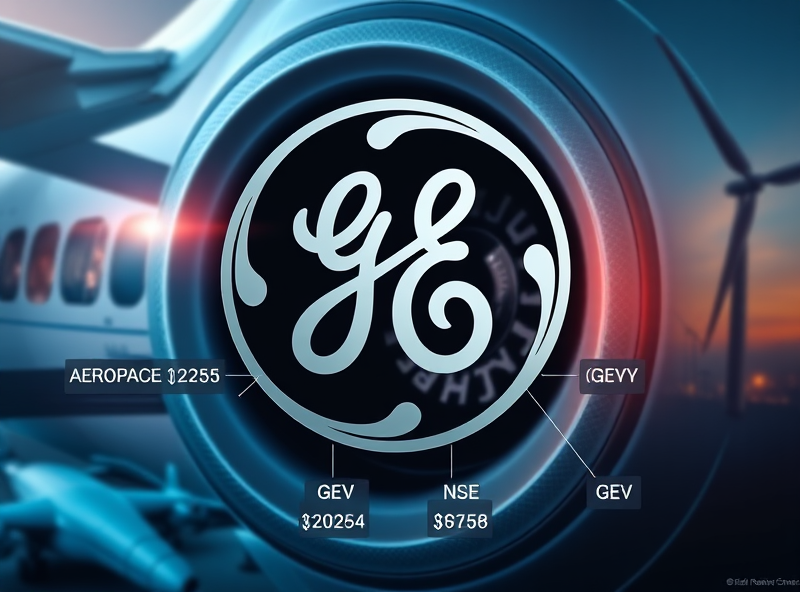TSMC and the Future of Global Semiconductors: Market Leadership and Risk Outlook
TSMC’s Dominance in the Semiconductor Foundry Market

Taiwan Semiconductor Manufacturing Company (TSMC) has firmly established itself as the undisputed leader in the global semiconductor foundry market. As of 2024, TSMC holds over 55% of the global market share, significantly outpacing competitors like Samsung Foundry and GlobalFoundries. This dominance is not just a result of scale, but of sustained innovation, advanced manufacturing capabilities, and strategic customer relationships.
TSMC’s strength lies in its ability to consistently deliver cutting-edge process nodes ahead of the competition. For instance, its 3nm and upcoming 2nm process technologies are already being adopted by major clients such as Apple, AMD, and NVIDIA. These advanced nodes allow for more powerful and energy-efficient chips, which are crucial for next-generation devices like AI accelerators, smartphones, and autonomous vehicles.
Another key factor in TSMC’s leadership is its foundry-only business model. Unlike vertically integrated rivals, TSMC focuses solely on manufacturing chips designed by its clients. This neutrality has made it the go-to partner for fabless companies seeking top-tier manufacturing without competitive conflicts.
However, TSMC’s dominance also brings challenges. Geopolitical tensions, particularly between the U.S. and China, have raised concerns about the global supply chain’s vulnerability. In response, TSMC is diversifying its manufacturing footprint by investing in new fabs in the U.S., Japan, and Germany. These moves aim to enhance supply chain resilience and reduce overdependence on Taiwan.
For businesses and consumers alike, TSMC’s continued leadership means access to faster, more efficient technologies. From smartphones to cloud computing, the company’s innovations ripple across nearly every aspect of modern life.
For a deeper look into TSMC’s global strategy and market share, you can refer to this recent report by TrendForce: https://www.trendforce.com/presscenter/news/20240117-11775.html
TSMC’s Dominance in the Semiconductor Foundry Market

As the global demand for semiconductors continues to surge, Taiwan Semiconductor Manufacturing Company (TSMC) stands at the forefront of innovation and production capacity. One of the key growth drivers for TSMC is its leadership in advanced process nodes, such as 5nm and 3nm technologies, which are essential for powering next-generation AI applications, smartphones, and high-performance computing systems. These nodes enable faster, more energy-efficient chips, giving TSMC a competitive edge over rivals.
Another critical area is advanced packaging technologies like 3D IC and chiplet integration. These innovations allow for greater performance and miniaturization, crucial for AI workloads and edge computing. TSMC’s CoWoS (Chip-on-Wafer-on-Substrate) and InFO (Integrated Fan-Out) packaging solutions are already being adopted by major tech companies, including Apple and AMD.
Artificial Intelligence (AI) is also fueling semiconductor growth, and TSMC is strategically positioned to benefit. As AI models become more complex, they require powerful, custom-designed chips—many of which are manufactured by TSMC. The company’s close collaboration with leading fabless firms like NVIDIA and AMD ensures a steady pipeline of cutting-edge AI chips.
In summary, TSMC’s market leadership is reinforced by its investments in advanced nodes, packaging, and AI-centric chip production. These factors not only drive growth but also solidify its critical role in the global tech ecosystem.
For a deeper look into TSMC’s technology roadmap, you can refer to their official site: https://www.tsmc.com/english/dedicatedFoundry/technology
TSMC’s Dominance in the Semiconductor Foundry Market

As the world’s largest dedicated semiconductor foundry, Taiwan Semiconductor Manufacturing Company (TSMC) plays a pivotal role in the global tech ecosystem. Its advanced manufacturing capabilities—especially in leading-edge nodes like 5nm and 3nm—make it the go-to partner for major tech giants such as Apple, AMD, and NVIDIA. However, TSMC’s dominance also places it at the center of growing geopolitical tensions, particularly between the U.S. and China.
To navigate these pressures, TSMC is diversifying its manufacturing footprint. The company is investing heavily in new fabs in the U.S. (Arizona), Japan, and potentially Germany. These moves aim to reduce overreliance on Taiwan, which is geopolitically sensitive due to its complex relationship with China. By expanding globally, TSMC is not only mitigating geopolitical risks but also aligning with national security interests of key partners.
For consumers and businesses alike, this strategy is crucial. It ensures more resilient semiconductor supply chains, which are foundational to everything from smartphones to electric vehicles. In a world increasingly dependent on digital infrastructure, TSMC’s proactive global strategy offers a blueprint for balancing innovation with risk management.
For further reading on TSMC’s global expansion strategy, you can refer to this article by Bloomberg: https://www.bloomberg.com/news/articles/2023-12-29/tsmc-s-global-expansion-aims-to-ease-geopolitical-risks
Future Expansion, R&D, and Competitive Outlook

As the global semiconductor industry continues to evolve, TSMC (Taiwan Semiconductor Manufacturing Company) remains at the forefront, not only as a market leader but also as a key innovator. Looking ahead, TSMC’s future expansion and R&D strategies are critical to maintaining its competitive edge in an increasingly complex and competitive landscape.
TSMC is investing heavily in global expansion, with new fabs under construction in the United States (Arizona), Japan, and Germany. These strategic moves aim to diversify its manufacturing footprint and reduce geopolitical risks associated with Taiwan’s central role in chip production. By localizing production closer to major clients and markets, TSMC is enhancing supply chain resilience and aligning with national interests in semiconductor self-sufficiency.
In terms of R&D, TSMC allocates billions annually to advance process technologies. The company is leading the race in sub-3nm nodes, with plans to mass-produce 2nm chips by 2025. These innovations are essential for enabling next-generation applications in AI, 5G, and high-performance computing. Moreover, TSMC is exploring advanced packaging technologies like CoWoS and SoIC, which are crucial for chiplet-based architectures.
Competitively, TSMC faces growing pressure from rivals like Samsung Foundry and Intel Foundry Services. However, its robust customer base—including Apple, AMD, and NVIDIA—combined with its consistent execution and technological leadership, positions it strongly. The key challenge will be balancing aggressive expansion with cost control and maintaining its high yield rates across new fabs.
For professionals and investors, understanding TSMC’s forward-looking strategies offers valuable insight into where the semiconductor industry is headed. It also highlights the importance of innovation, supply chain agility, and geopolitical awareness in sustaining technological leadership.
Source: https://www.tsmc.com/english/newsEvents/blog-2023-09-07







